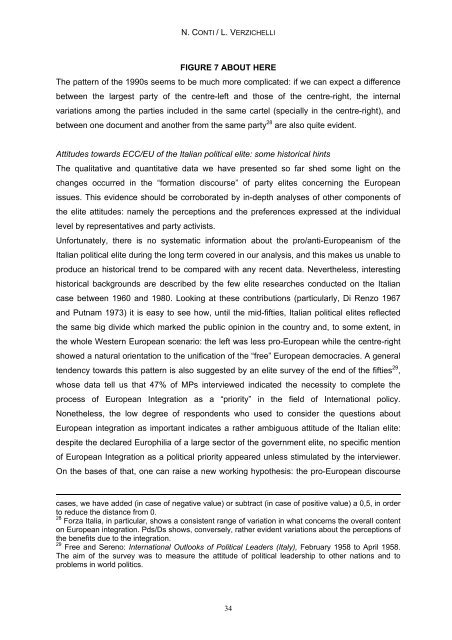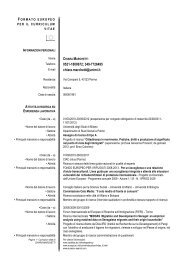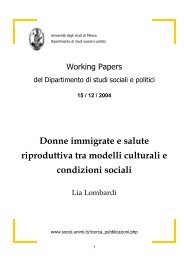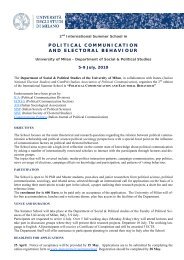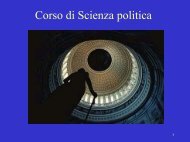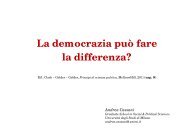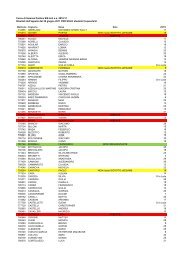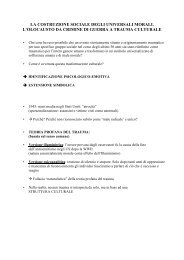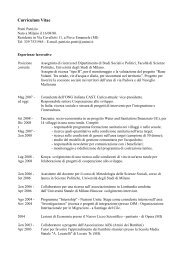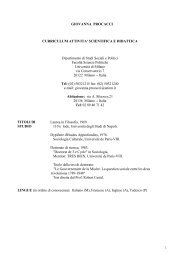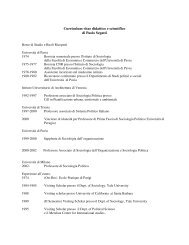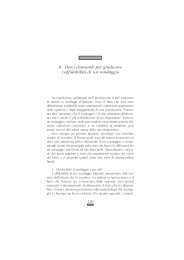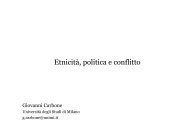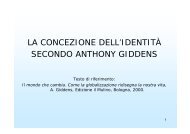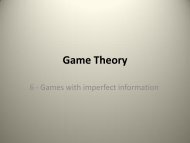The european dimension of political discourse in Italy. A ... - CIRCaP
The european dimension of political discourse in Italy. A ... - CIRCaP
The european dimension of political discourse in Italy. A ... - CIRCaP
Create successful ePaper yourself
Turn your PDF publications into a flip-book with our unique Google optimized e-Paper software.
N. CONTI / L. VERZICHELLI<br />
FIGURE 7 ABOUT HERE<br />
<strong>The</strong> pattern <strong>of</strong> the 1990s seems to be much more complicated: if we can expect a difference<br />
between the largest party <strong>of</strong> the centre-left and those <strong>of</strong> the centre-right, the <strong>in</strong>ternal<br />
variations among the parties <strong>in</strong>cluded <strong>in</strong> the same cartel (specially <strong>in</strong> the centre-right), and<br />
between one document and another from the same party 28 are also quite evident.<br />
Attitudes towards ECC/EU <strong>of</strong> the Italian <strong>political</strong> elite: some historical h<strong>in</strong>ts<br />
<strong>The</strong> qualitative and quantitative data we have presented so far shed some light on the<br />
changes occurred <strong>in</strong> the “formation <strong>discourse</strong>” <strong>of</strong> party elites concern<strong>in</strong>g the European<br />
issues. This evidence should be corroborated by <strong>in</strong>-depth analyses <strong>of</strong> other components <strong>of</strong><br />
the elite attitudes: namely the perceptions and the preferences expressed at the <strong>in</strong>dividual<br />
level by representatives and party activists.<br />
Unfortunately, there is no systematic <strong>in</strong>formation about the pro/anti-Europeanism <strong>of</strong> the<br />
Italian <strong>political</strong> elite dur<strong>in</strong>g the long term covered <strong>in</strong> our analysis, and this makes us unable to<br />
produce an historical trend to be compared with any recent data. Nevertheless, <strong>in</strong>terest<strong>in</strong>g<br />
historical backgrounds are described by the few elite researches conducted on the Italian<br />
case between 1960 and 1980. Look<strong>in</strong>g at these contributions (particularly, Di Renzo 1967<br />
and Putnam 1973) it is easy to see how, until the mid-fifties, Italian <strong>political</strong> elites reflected<br />
the same big divide which marked the public op<strong>in</strong>ion <strong>in</strong> the country and, to some extent, <strong>in</strong><br />
the whole Western European scenario: the left was less pro-European while the centre-right<br />
showed a natural orientation to the unification <strong>of</strong> the “free” European democracies. A general<br />
tendency towards this pattern is also suggested by an elite survey <strong>of</strong> the end <strong>of</strong> the fifties 29 ,<br />
whose data tell us that 47% <strong>of</strong> MPs <strong>in</strong>terviewed <strong>in</strong>dicated the necessity to complete the<br />
process <strong>of</strong> European Integration as a “priority” <strong>in</strong> the field <strong>of</strong> International policy.<br />
Nonetheless, the low degree <strong>of</strong> respondents who used to consider the questions about<br />
European <strong>in</strong>tegration as important <strong>in</strong>dicates a rather ambiguous attitude <strong>of</strong> the Italian elite:<br />
despite the declared Europhilia <strong>of</strong> a large sector <strong>of</strong> the government elite, no specific mention<br />
<strong>of</strong> European Integration as a <strong>political</strong> priority appeared unless stimulated by the <strong>in</strong>terviewer.<br />
On the bases <strong>of</strong> that, one can raise a new work<strong>in</strong>g hypothesis: the pro-European <strong>discourse</strong><br />
cases, we have added (<strong>in</strong> case <strong>of</strong> negative value) or subtract (<strong>in</strong> case <strong>of</strong> positive value) a 0,5, <strong>in</strong> order<br />
to reduce the distance from 0.<br />
28 Forza Italia, <strong>in</strong> particular, shows a consistent range <strong>of</strong> variation <strong>in</strong> what concerns the overall content<br />
on European <strong>in</strong>tegration. Pds/Ds shows, conversely, rather evident variations about the perceptions <strong>of</strong><br />
the benefits due to the <strong>in</strong>tegration.<br />
29 Free and Sereno: International Outlooks <strong>of</strong> Political Leaders (<strong>Italy</strong>), February 1958 to April 1958.<br />
<strong>The</strong> aim <strong>of</strong> the survey was to measure the attitude <strong>of</strong> <strong>political</strong> leadership to other nations and to<br />
problems <strong>in</strong> world politics.<br />
34


